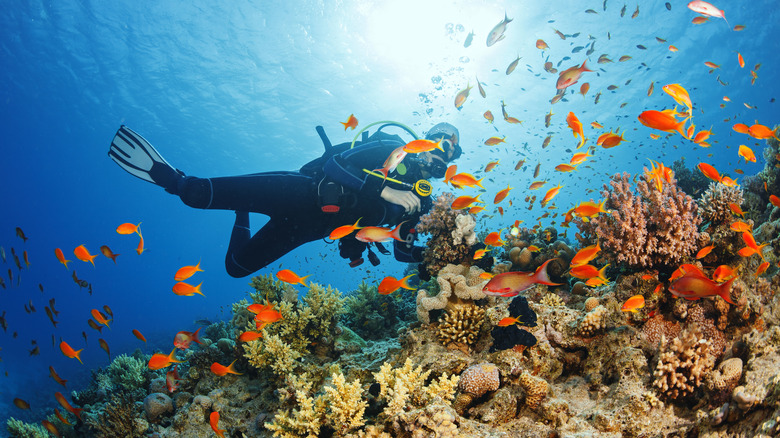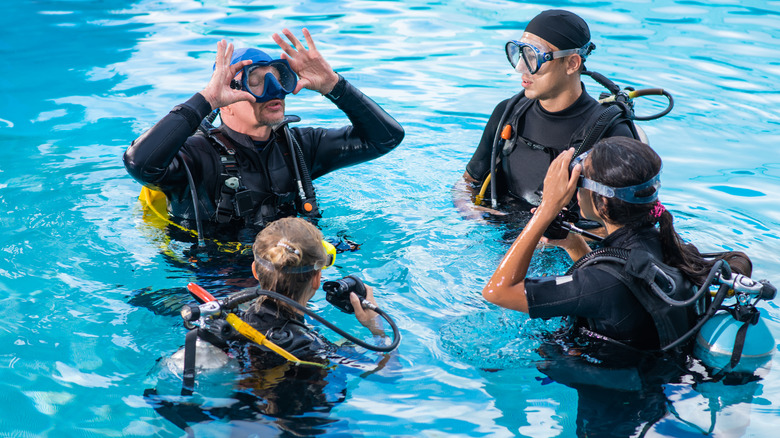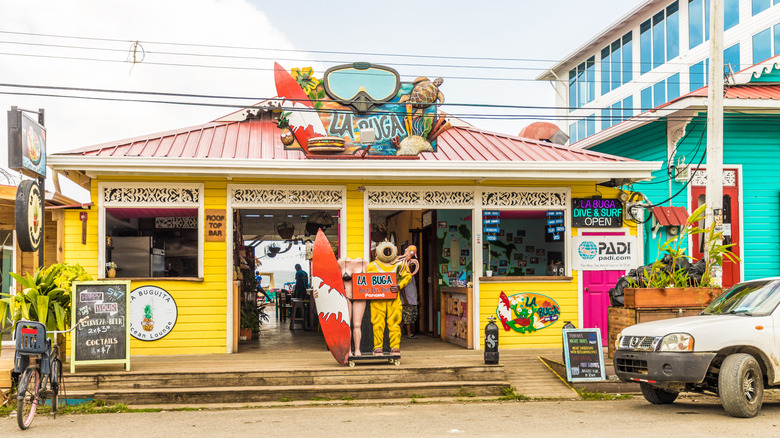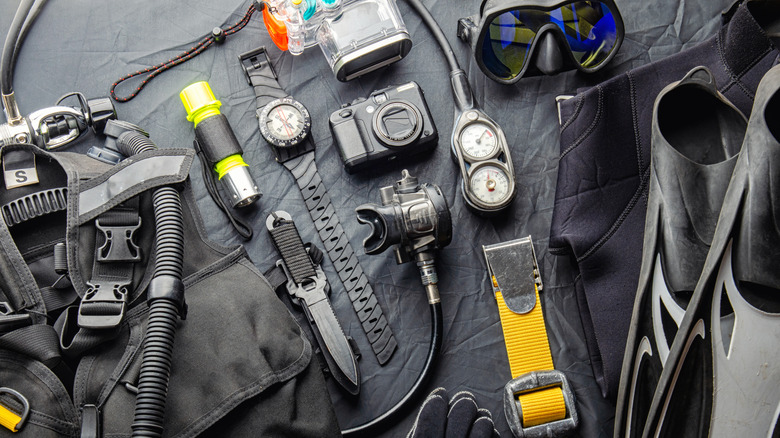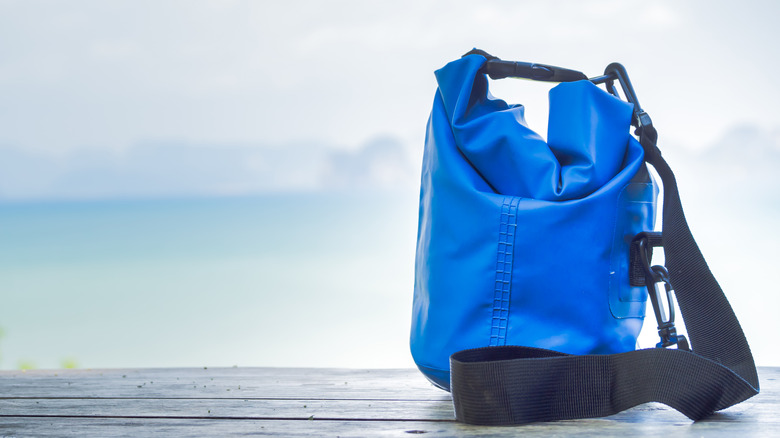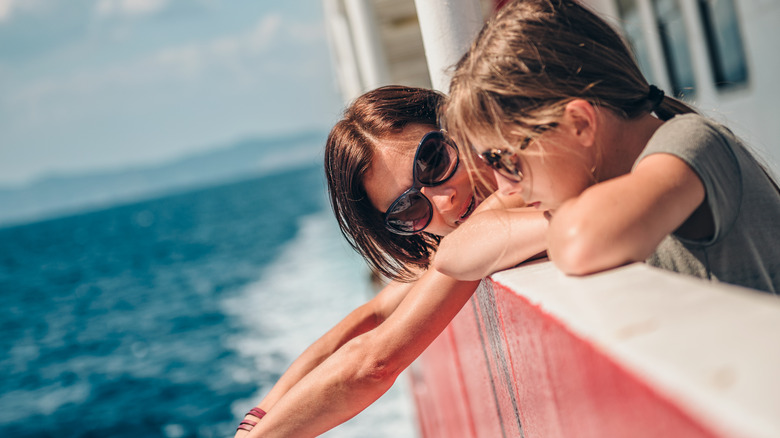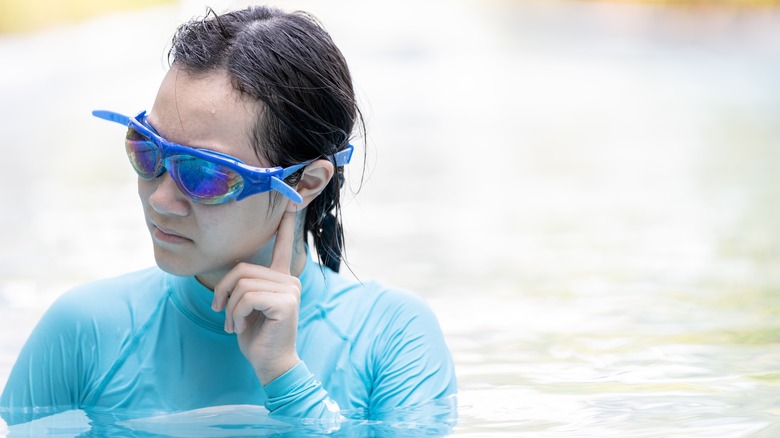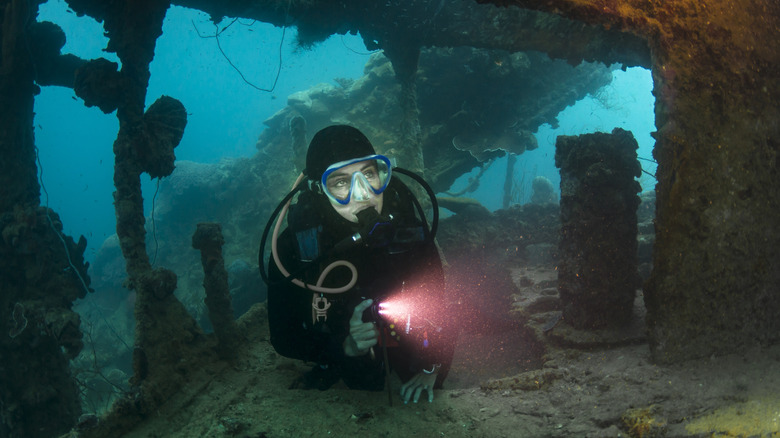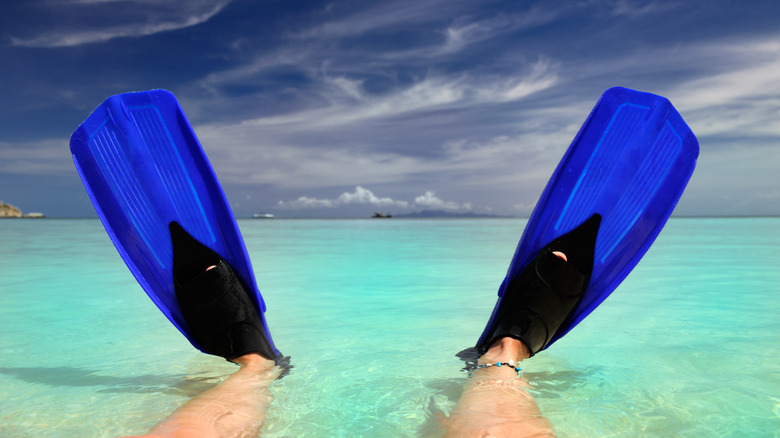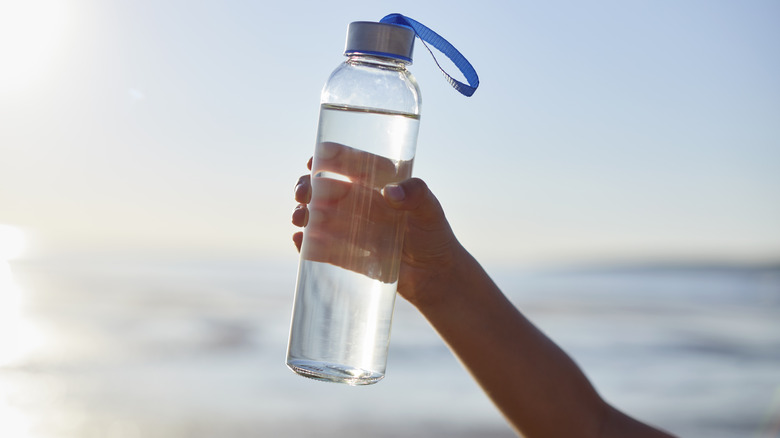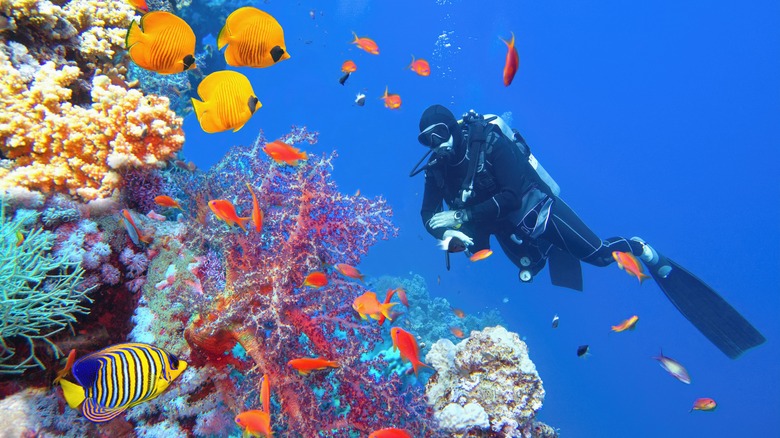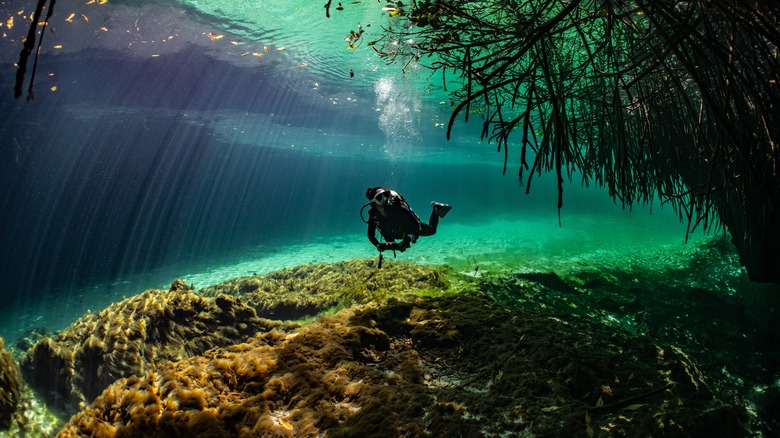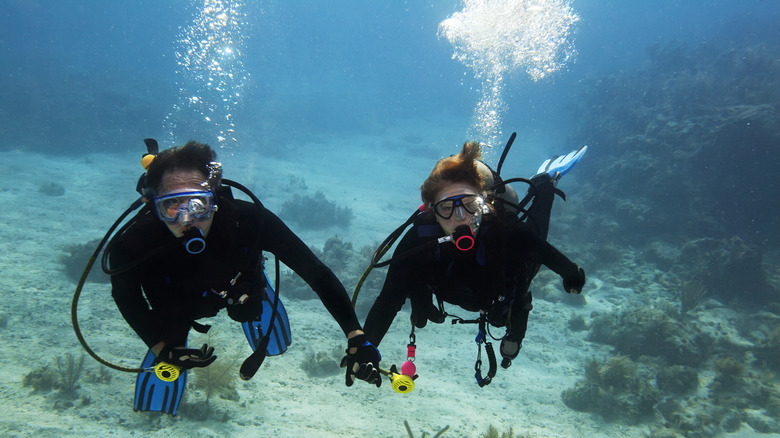A Beginner's Guide To Scuba Diving Like A Professional
We may receive a commission on purchases made from links.
It's easy to see why so many people fall in love with scuba diving. This activity has significant upsides that range from exploring aquatic wonderlands and building confidence to meeting new friends and reducing stress. A remarkable hobby that can be practiced by the whole family (children as young as eight can participate in shallow water dives), scuba diving opens a portal to a unique and beautiful adventure. There are plenty of fabulous places to visit on a scuba holiday, including myriad resorts that offer some of the world's best dives right from their property.
Professional Association of Diving Instructors (PADI) IDC Staff Instructor Amy Phillips works with Deep Blue Divers at Six Senses Kanuhura, Maldives. Talk about a stunning place to scuba dive! When asked why people should participate in the activity, she told Islands exclusively, "Why not? Diving is great for all sorts of reasons. It's an entirely new world beneath the waves filled with color, movement, and a medley of excitement ... It's not a difficult sport and is open to most people." Plus, she said, while diving is relaxing, it can also be heart-pumping enough to "spark a nerve for the adrenalin junkies." Can't wait to hit the waves? Consider this beginner's guide your primer to scuba diving like a professional.
Get certified or at least take a lesson
While you can scuba dive without certification, PADI instructor Amy Phillips recommended taking at least a few courses before your underwater adventures. The lessons, she said, will "make you a safer, more confident diver and allow you to progress so that in the future you can explore wrecks, dive deeper and find some more challenging sites." Not sure scuba diving is right for you? Sign up for a PADI Discover Scuba® diving course. A shorter, less-intensive option, this course allows divers to "get a little taster," Phillips shared. Plus, it can count towards certification later.
The beginner's scuba certification, PADI® Open Water Diver, involves studying the principles and terminology of scuba diving in a classroom or online setting, learning basic skills in a pool or calm water environment, and completing four open water dives (i.e., in a lake or ocean) with an instructor. The course will take between four and seven days to complete. PADI dive classes are available globally –- you'll even find some in Iceland.
Find one near you and sign up to get certified before your trip so you can hit the open water as soon as you arrive at your destination. No time to take classes before you leave for vacation? Many resorts offer scuba diving courses, including one-day certification options or more intensive PADI-certified courses. And if you're visiting an all-inclusive resort, many offer diving as a top included amenity.
Choose the right dive shop
Once you're ready to get certified or head out on a diving expedition, it's time to choose the best dive shop (a.k.a. dive center) for your needs. Consider a dive center your one-stop shop for everything from training and tank filling to dive trip guides to equipment sales and servicing. Plenty of these shops are around, especially if you're traveling to scuba hubs like Australia, the Maldives, and Hawaii. All you need to do is find the one that works for you.
We suggest doing your research before you take the plunge with a specific shop. Ask fellow divers for recommendations, scour online reviews, and examine the company's website, especially the "About Us" page, to learn more about the divers and see their credentials. If you can, opt for a PADI-certified shop; that way, you'll know it will adhere to PADI's strict standards. According to PADI's website, red flags include poorly kept rental equipment, unenthusiastic staff, shared stories about negative experiences with that company, or a bad feeling in your gut. If any of these signs crop up, walk (or swim) away!
Buy the right equipment
Scuba diving requires more equipment than some might think. In addition to an oxygen tank, regulator, fins, and a mask, divers will need a snorkel, wetsuit, defog, a dive computer, a buoyancy control device (BCD), and possibly a dive weight. If you'd like to immortalize the amazing creatures you see, consider adding an underwater camera (like a GoPro with a waterproof dive mask mount) to your kit. Other scuba diving gear more advanced divers should consider bringing along includes:
- Signaling gear like an inflatable signal tube or delayed surface marker buoys so people on the boat can find you easily if you get lost or into trouble.
- A dive knife in case you get tangled in a net or fishing line.
- A dive light for night diving or even day dives (things get dark and grey at 30 feet below the surface).
- A tank banger: A small but efficient ball and band that creates a "clank" noise on the tank to get the attention of nearby scuba divers.
- A dive compass: If your dive computer doesn't have a compass (which most do these days), you'll want a quick and easy way to note your location and that of your boat.
If you're feeling uber-confident in your abilities, why not add some scuba diving gear for thrill-seeking divers to your pack? For instance, an Insta360 X3 waterproof action camera is ideal for catching fast shots (shark chase, anyone?) and can be submerged up to 165 feet.
Bring a dry bag
When you're busy admiring the marine life, you'll want somewhere safe to keep the valuables you left on the boat. Whether you've brought a watch, wallet, or phone, it's best to lock it away in an airtight, waterproof container like a dry bag. While it's not essential to purchase a fully waterproof bag (water-resistant bags can work, too), it is worthwhile to consider how important those valuables are to you. If there's even a slight risk of the bag falling into the water, would you be devastated if the contents became saturated because the bag wasn't waterproof?
If the answer is yes, then a dry bag should be in your future. With so many bags on the market, making the right choice can feel overwhelming. Here are a few things to look for when choosing the best dry bag for your next dive:
- Size: Smaller is easier. Plus, you won't need anything too big if you only have a phone and wallet to protect. If you want to include a towel, opt for something larger.
- Color: if you want a large bag, consider a clear one. It's easier to find things. Keep valuables wrapped in a towel or smaller pouch.
- Closing mechanism: The three main sealing options for dry bags are roll-down tops, a ziplock seal, and a waterproof zipper. If you aren't planning to submerge it completely, a roll-down top is well-priced and easy to use and carry.
Avoid seasickness
There's little worse than getting seasick when bobbing in an open ocean. Sometimes, the sea is so rough that nausea is almost unavoidable, but often, divers can minimize, or hopefully prevent, seasickness symptoms. First, watch what you eat. According to the Divers Alert Network (DAN), "An empty stomach is more susceptible to irritation," so be sure you eat something. A small, healthy meal is best as heavy dishes and fried food can make you feel worse. It's never a good idea to stuff your face before a swim, so be sure to finish eating at least 45 minutes before you leave. DAN also advises divers to avoid drinking alcohol the day before their adventure.
Staying hydrated is also crucial to warding off seasickness. Water is a great option, but sports drinks can help, too. Just steer clear of carbonated beverages and caffeine. Other helpful aids can include over-the-counter anti-nausea meds like Benadryl, Bonine, and Dramamine, but be aware that some can make you drowsy, so it's best to try them before diving. A prescription seasickness patch, ginger, and acupressure bands are also potential options. It's a trial-and-error situation, so keep trying things to see what works best for you. According to Technical Diving International (TDI) and Scuba Diving International (SDI), divers can combat seasickness on board the boat by staring at the horizon, breathing slowly and deeply, relaxing, sipping cool water, sucking on ginger, or closing their eyes.
Clear your ears
Equalizing the pressure in your ears is essential for scuba diving success. The lower you go, the higher the pressure on your ears, potentially leading to pain and injury. That's why learning how to clear your ears properly is essential before heading down for a dive. A simple and well-known way to do this is called the Valsalva Maneuver. Pinch your nostrils, then blow gently through your nose. Too much force could cause damage, so take it slow and easy.
Other ways to clear your ears include the Frenzel Maneuver, which is gentler and easier to control. Exhale fully, then pinch your nose and close the back of your throat. Make a "K" sound to force the back of the tongue up, compressing air and gently popping the ear. Swallowing is another effective and safe way to equalize the pressure in your ears. It's as easy as pinching your nose and swallowing. This is also known as the Toynbee Maneuver. Moving and wiggling the jaw can also help, although this can be tricky while using a regulator. For the best results, prepare your ears before you jump in by equalizing them every few minutes in the hours leading up to your dive before you jump in. Chewing gum can be helpful for this.
Know your limits
Just because you're certified to a certain depth doesn't mean you should. Similar to our lives on the ground, certain factors will affect the amount and types of things we can do in a day. If we're feeling under the weather mentally or physically, for instance, we may not be able to carry on in the same way as we can on a day when we're at our best. The same goes for the underwater world. Every time you dive, it's important to be honest with yourself. Are you feeling healthy? Are you confident, happy, and optimistic? Is your equipment in good shape? Are the conditions optimal for a dive? These are all questions you should ask before jumping off the boat.
Divers should stick to the limits awarded to them according to their certification. If your Open Water certification allows you to dive to 60 feet, stick to that limit until you've taken further courses or are accompanied by an instructor who can take you deeper safely. Also, consider the conditions (i.e., weather, currents, waves, and water temperature), advised experts at dipndive.com. In an article about dive safety, they write, "Try to consider all the environmental factors when planning a dive. If there are any potential hazards, be sure to give yourself a margin of safety."
Wear dive socks
Wearing socks will make you look (and feel) like a scuba diving professional. In addition to adding cushioning to your feet and ankles, helping to prevent blisters caused by fins, dive socks can help keep your feet and toes warm. Thicker socks can also add a layer of warmth and protection against rocks.
Neoprene socks are a good pick as they help keep feet warm and make it easier to get your feet into a wetsuit boot. They're generally thicker than regular socks, so they'll fit better into dive shoes. They can also help prevent water from rushing into your dive boots. On the other hand, dive socks are thinner and work well with hard-soled dive boots. They, too, can keep your feet warm and dry while preventing water from getting into the boot. Choose a low-cut sock if you're more interested in an option that makes it easy to get your foot into a full-foot fin or dive boot. Just know that while some divers find these a more comfortable option, they aren't as warm.
Stay hydrated
The benefits of staying hydrated extend beyond preventing seasickness — it can also aid in combatting decompression sickness. Be sure to drink lots of water (and no alcohol) the day before a dive. Keep drinking water on the morning of your dive to ensure you're not dehydrated. While it's easy to forget to drink while you're scuba diving –- you are surrounded by water, after all –- it's just as important to drink during a long dive. Hydration reservoirs or fruit juice pouches are the easiest ways to hydrate underwater. Have someone teach you the tricks to drinking through a bite-valve or using screw lids underwater before your next dive.
According to Scuba Diving International and Technical Diving International, researchers found that adequately hydrating before a dive can significantly decrease the formation of bubbles after decompression, which is why this simple trick can help prevent decompression sickness. "Proper hydration is essential for technical diving ... too often, divers drink too little, too late or drink fluids that don't hydrate them properly," the agency advises. Make sure to stay on top of your fluids!
Stay calm
While scuba diving is one of the most relaxing and beautiful experiences to enjoy in the water, there are times when it can feel stressful or anxiety-inducing. Sinking deep into the ocean with a tank on your back can, for some, feel a bit scary despite their training. Stress can cause divers to use more air, limiting their time underwater and reducing their energy levels. That's why it's so important to stay calm and relaxed.
Eliminating stress during your dive should start the day before. Prepare your dive bag, meet with the dive boat and team, eat a small dinner, avoid alcohol, and get eight hours of sleep. On the day of, take it easy on the caffeine. Caffeine is a diuretic (which can add to dehydration), and the stimulating effects can worsen anxieties. Check your equipment to reassure yourself that everything is working well. Stick to your limits; don't be afraid to bail if things don't feel right.
Speaking to Explore, PADI instructor Amy Phillips recommended divers take their time underwater and advised them not to get intimidated by over-eager group members. "Diving is not a competitive sport," she explained. "And while it's ok to find ourselves humming with a little bit of nervous energy before a dive, remember we dive because it's beautiful, exciting, and fun!"
Be aware of your surroundings
Being too deep under the surface for too long can lead to decompression sickness, which is why it's so important to keep track of your depth while diving. However, the underwater beauty can take over, making you lose track of details like the boat's location, where your buddy is swimming, and how far down you've traveled. It's essential to be aware of what's below and above you, scanning for things like boats, the diving group, and your proximity to delicate corals. In the diving world, this is called global awareness.
Divers should also be self-aware. Take a moment to check in with your mental state, be aware of your gear and how it's working, and keep breathing slowly and evenly. Finally, experts at Scuba Guru say to be situationally aware. This means being able to determine things like currents and tides as well as your location.
Speaking of surroundings, the Florida Keys have been deemed a perfect place to visit for new divers. Key Largo, in particular, is known as the world's scuba diving capital, offering myriad dive sites for scuba enthusiasts of all levels. This is where you'll find the world's third-largest barrier reef, so the underwater creatures are pretty much unbeatable.
Find a good dive buddy
There are plenty of reasons to dive with a buddy, and they don't all have to do with keeping you safe. Yes, having a buddy will help if you run out of gas, get tangled in kelp, or have an issue with your equipment. And yes, they can keep track of you (and you of them) when you're exploring the ocean's underbelly. But buddies can also be invaluable for seemingly small pre-dive aspects like helping you pull on your gear, choosing a dive destination, and (if they're more experienced) teaching you new skills. Plus, they can help make the dive more fun by sharing in the experience, joking together, or even pulling funny faces when you're deep below the ocean's surface.
To find a buddy, talk to your dive shop, look on social media sites, or ask your diving friends if they know someone who would gel with you and be up to diving at the times and locations you're interested in. Be sure your buddy is certified so you can rest assured that they know what they're doing underwater. Before you head out for a dive, meet your buddy, get to know each other, and make sure you can trust them.
